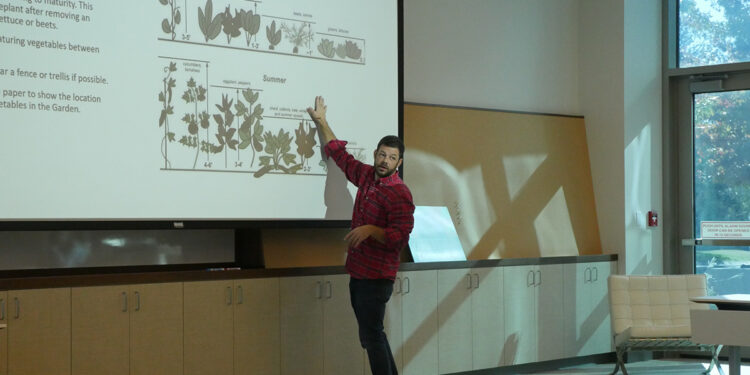“We talked about our Creek Nation seal and how we are an agrarian society and want to promote what our ancestors did.” – Julie Norem
TVLSE, Oklahoma – Gardening has many benefits. It is good for the environment and is a way to become self-sufficient in food cultivation. The Muscogee (Creek) Nation was originally an agrarian society that relied on land cultivation. The nation is still exploring new avenues to promote cultivation and horticulture. The MCN Conservation District hosted the first urban gardening workshop in a new series at the Gilcrease Museum on Nov. 30.
The urban gardening workshop featured Jack Titchener, an urban soil health specialist for the Oklahoma Conservation Commission and the Natural Resources Conservation Service. The new workshop series aims to promote self-sufficiency and enable others to grow their produce.
“I think it is important for us to connect with nature, ” Titchener said. “It’s maybe more important than people realize about the connections between where your food comes from, and climate change.”
According to MCN Conservation District Conservationist Julie Norem, although this is not the first time a gardening workshop has been hosted, it is the first time a workshop has been hosted outside of Okmulgee. Encouraging others to garden is a team effort across the tribe.
“The last couple of years, we’ve been pushing, trying to get people to start their gardens,” Norem said. “We work with reintegration and environmental services.”
The MCN Conservation District has received grants that have allowed them to start gardens across the nation, like the elderly nutrition center and the Morris Indian Community. Once the gardens have started, it is up to the Muscogee citizens of that community to take care of them.
For Titchener, gardening began as a hobby. That is until he discovered you could make a career out of it. Titchener returned to school to earn an agricultural science degree from Oklahoma State University.
“I realized how powerful it was to grow your food,” Titchener said. “How to sustain yourself that way.”
Titchener and Norem agree that urban gardening is an excellent way to combat food insecurity, an issue many Native Americans face today.
“That’s another reason we want to promote urban gardening,” Norem said. “We talked about our Creek Nation seal and how we are an agrarian society and want to promote what our ancestors did.”
According to Norem, her department has talked to many citizens that have memories of eating produce grown by their families at home. Norem recalled when her family gardened, and fresh produce was available at their fingertips.
“I remember walking in the plow row with my bare feet and going back later and eating the tomatoes right out of the garden,” Norem said. “I definitely remember that fondly.”
Beginners without a lot of gardening experience might not realize the potential their property has for cultivating produce. Titchener said vegetables could grow in yards big and small.
“If most people were to try their hand, you don’t need a large area to grow a lot of vegetables,” Titchener said. “That would shock many people too is the amount you could produce from just a normal yard.”
Norem said there is no exact date for the next workshop but said it would take place in January.





